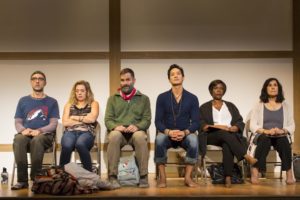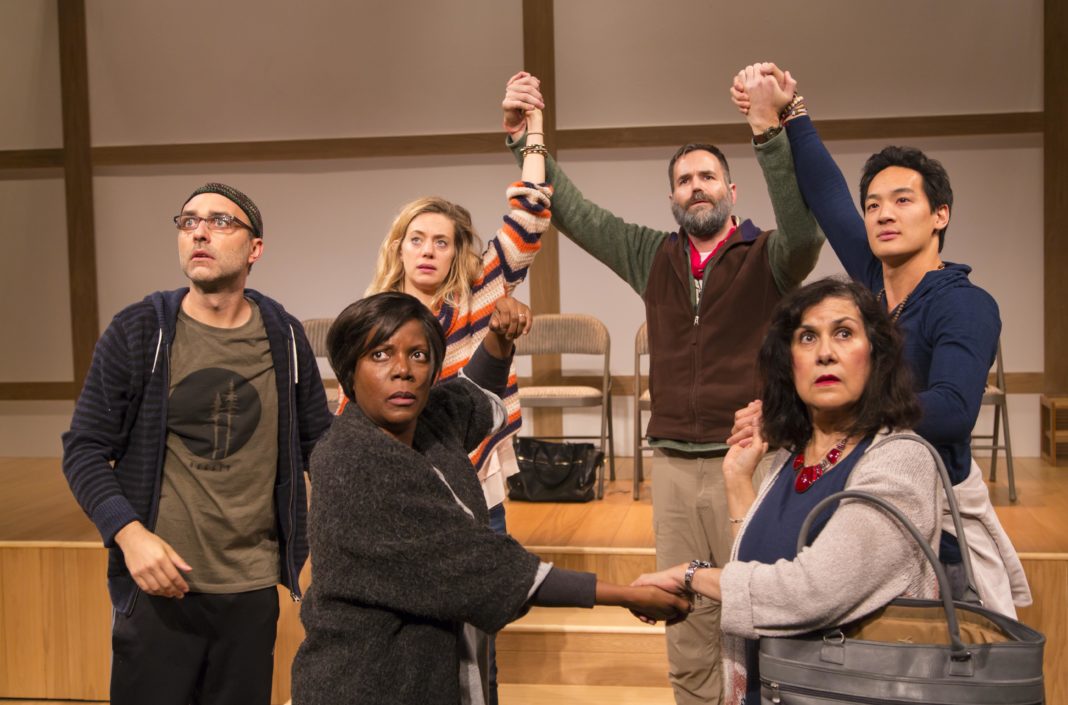There are large groups of people who opt to temporarily drop out of the hustle and bustle and contemporary life and go to a silent retreat. In other words, a retreat where most of the day is spent without ever saying a word. Playwright Bess Wohl went to such a retreat and as unlikely as it sounds, her experiences inspired her highly acclaimed play Small Mouth Sounds. The show opens on Friday at the Broad Stage in Santa Monica.
I know what you’re thinking at this point. How do you write a play in a setting where dialogue isn’t necessarily the engine driving the play? I asked Wohl about her experience at the retreat and the role of silence in her life and work.
What was your experience at the retreat you attended?
I felt like there was almost this trajectory that was like an arc. The first few days you come and the voices get louder and louder. And by day three you felt you were going insane. After you hit that breaking point there is something on the other side of it that is quieter and is a huge relief that you don’t have to perform one’s personality all the time. It gets worse before it gets better.
With all of our reliance on stimulation from our cell phones, computers, televisions, etc.…do you think we as people have the ability to sit still with our thoughts or our emotions? It seems the characters in the play don’t really have a sense of that.
I think it is definitely possible. But I think it is really hard and it’s getting harder and harder with all of the noise we encounter all the time. I live in New York City, and Los Angeles is similar, it’s a constant influx of information and other people. I think that takes a really big toll on people. I think all of that noise was part of my impulse to write this play. Could I block it out? The experience of making it when I was watching it over and over was sitting in the dark and allowing myself to be in silence and observe what I had made. That was hard. I would find myself fidgeting and wondering why there wasn’t a laugh line here. It was a test to see if I could sit in silence with my own work.
How did you develop the characters in the play who chose to be at this retreat?
I’m always interested in where the humor lies in people and their foibles. I think that makes people loveable. Part of that is looking for the funny in people and in myself. But I found was I worked on this play I really identified with each character in different ways at different moments. When I started working on the play there’s the young woman who was the hot mess. That’s me for sure and I still have moments of her. The more I worked on it I realized I have elements of all these people in my personality.
You’ve been talking to people about this play for a few years. Do you find that ironic? Are you tired of talking about it?
(Laughs). That’s such a funny question. It’s funny to talk so much about a silent play. I don’t get tired talked about it since it’s been such a joyful experience for me. And the best part is seeing what other people have to say about it. What’s been fun sharing it with a varying audience is to hear different interpretations and reactions and points of entry. At this point I’m less interested in what I have to say than what audiences have to say.

I suppose the last thing you’d want at the end of a performance of Small Mouth Sounds would be total silence. But if that happened, how would you respond?
(Laughs). Wow. I would either think I had written the best play ever or the worst play ever. I wouldn’t know which. I think the curtain call…I don’t know. Sometimes it can lessen the experience of the play. You want people to be left with the play but there’s this thing that lets everybody off the hook and breaks the spell. At the same time I have so much respect for performers and I would feel bad if they didn’t get respect for their work. They have to be fully in the experience or the story isn’t told.
Charlie Chaplin once said “Sound spoiled the most ancient of the world’s art, the art of pantomime and has canceled out the great beauty that is silence.” Apart from your experience at this retreat, does silence play a greater or lesser role in your day-to-day life now?
I think it definitely takes a greater role. One unexpected benefit of working on this play is it introduced me to a community of spiritual teachers and leaders who came out and supported the play. I was an intermittent meditator when I worked on the play. I became more interested in meditation and spiritual seekers. I’m trying now to bring, not silence; I’m going to write plays with lots of dialogue again, but this attitude of mindfulness and listening to my life and work.
Photo Credit: T. Charles Erickson











